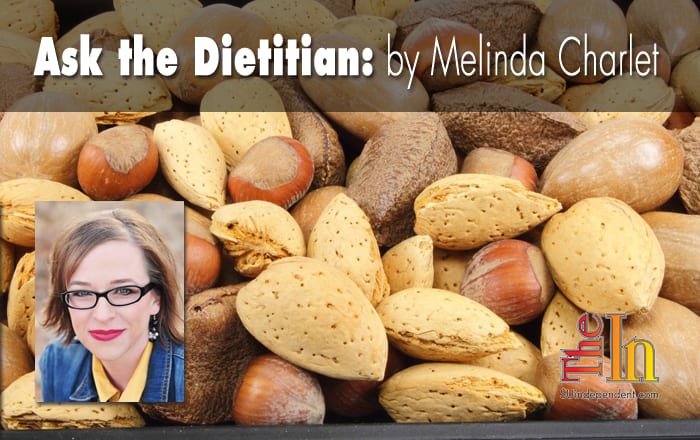 Written by Melinda Charlet
Written by Melinda CharletDear dietitian,
I have a friend that eats nuts all of the time, and is always telling me how healthy they are. I like nuts, but thought they were high in fat and calories. Should I be eating them, and should I limit them to a certain amount per day? What is the best way to include nuts in my diet, and are certain nuts better than others?
-Feeling Nutty
Dear reader,
You and your friend are both correct. Nuts and seeds are high in fat and calories, but the fats they contain are the unsaturated, heart-healthy kind and can be a great addition to your diet, in moderation. Nuts and seeds are also a great source of fiber, protein, antioxidants, and plant sterols. There has been quite a bit of research done on the health benefits of nuts. Here are a few of the proven positive side-effects of including nuts and seeds in your diet and some recommendations on intake.
Weight Control
Nut intake is sometimes discouraged for people who want to lose weight due to nuts’ high fat content and the assumption that they may cause weight gain. However, research has shown that regular nut consumers tend to weigh less than those who rarely consume them. There are several theories as to why nuts don’t cause weight gain. Nuts contain considerable amounts of fiber and healthy fats which help promote satiety. Their protein content may also help suppress hunger. So, contrary to popular belief, when included in moderation as part of a healthy diet, nuts may actually promote weight loss.
Chia seeds have also been shown to promote weight loss. In a study of patients with metabolic syndrome, consuming a beverage that included chia seeds led to weight loss and showed an increase in adiponectin, a hormone that prevents obesity.
Heart Health
Several large studies have shown that regular nut consumption has been associated with significant reductions in the risk of coronary heart disease (CHD). The Adventist Health Study showed that participants who consumed nuts at least five times a week had an almost 50 percent reduction in the risk of CHD, compared to those who only ate nuts once a week. A study of 86,000 women showed that eating 5 ounces of nuts weekly led to a 35 percent lower risk of CHD, compared to those that ate less than 1 ounce monthly.
Part of this benefit may be due to improved cholesterol levels. Several different studies of various types of nuts have shown that adding nuts to a diet that is low in saturated fats shows a significant lowering of total serum cholesterol and LDL cholesterol (bad cholesterol).
Seeds have also been shown to have positive effects on heart health. Flax seeds have been shown to reduce blood pressure substantially. Chia seeds have been shown to increase EPA levels by 30 percent over the course of a 7-week study. EPA is an omega-3 fatty acid that helps promote healthy cardiovascular function.
Disease Prevention
Eating nuts on a regular basis can improve your overall health in many ways. Several specific disease states have been shown to be improved or prevented by nuts and seeds.
Diabetes:
Nut intake has been shown to decrease the risk of developing diabetes. The Nurses’ Health Study suggests that nut and peanut butter intake may decrease the risk for Type 2 diabetes in women. Participants who consumed an ounce of nuts five times a week lowered their risk of developing diabetes by 27 percent, compared to those that rarely or never consumed nuts. In an open-label study (where researchers and participants knew which treatment they were getting), flax seed was shown to lower blood sugar levels by 19 percent.
Gallstone Disease:
People that consume nuts frequently (5 times per week or more) have a lower risk of getting gallstone disease. The Nurses’ Health Study shows that women had a 25 percent reduced risk of having their gall bladder removed when they ate nuts frequently. Similar results were shown for men in the Health Professional’s Follow-up study. Men who ate nuts with the same frequency showed a 30 percent reduction in gallstone disease.
Diverticular Disease:
Sometimes, patients who have diverticular disease of the colon are advised to avoid nuts and seeds to reduce the risk of complications, but research does not actually support that recommendation. A study of more than 47,000 men showed that those that had higher nut consumption had a lower risk of diverticulitis.
Intake Recommendations
Based on this research, the American Heart Association recommends eating four servings of unsalted nuts a week. A serving is a small handful (or 1.5 ounces) of whole nuts or 2 tablespoons of nut butter. The Linus Pauling Institute recommends 1 ounce of nuts 5 times per week to get the most benefits. Try to stay away from the oil-roasted, sugar-covered, and salted nuts, as these additives negate some of the benefits.
Most nuts are healthy, but some are more so than others. Walnuts contain high amounts of omega-3 fatty acids, but almonds, pecans, pistachios, macadamia nuts, and hazelnuts are also quite heart healthy. Peanuts are technically legumes but are also relatively healthy. Brazil nuts are very high in selenium and can cause selenium toxicity if you eat more than the recommended one or two per day. Beneficial seeds include flax, chia, hemp, sunflower, sesame, and pumpkin seeds.
Nuts and seeds are very versatile. They can be snacked on by themselves or sprinkled onto a salad. Flax and chia seeds can be added to smoothies or protein shakes, added to baked goods, or sprinkled on yogurt or cereal. Make sure you change up your routine and try all of the various kinds of nuts and seeds, as they contain different amounts and kinds of nutrients.
Hopefully, this information has given you a good overview of the health benefits of nuts and seeds and explained why you should include them in your diet in moderation (unless you are allergic, of course). So go nuts, but remember that a little bit goes a long way.
Healthy wishes,
Melinda the dietitian
Feel free to submit your nutrition related questions, and I will address them in future editions of “Ask the Dietitian.”
Melinda Charlet is a registered and licensed dietitian who lives in St. George. She has a bachelor’s degree in medical dietetics and works throughout southern Utah and Nevada helping patients and clients achieve proper nutrition for their individual needs. She likes to create healthier versions of recipes in her free time. She assists people with a variety of conditions, including diabetes and kidney disease, and counsels people who would like to lose some weight, need help dealing with cholesterol issues, or simply want to live healthier lifestyles. Send her your questions to [email protected], or connect with her on Facebook at https://www.facebook.com/MelindaCharletRD.




